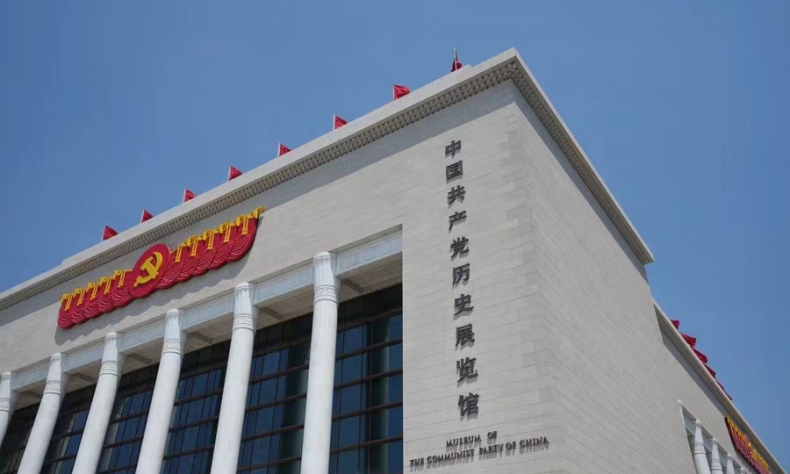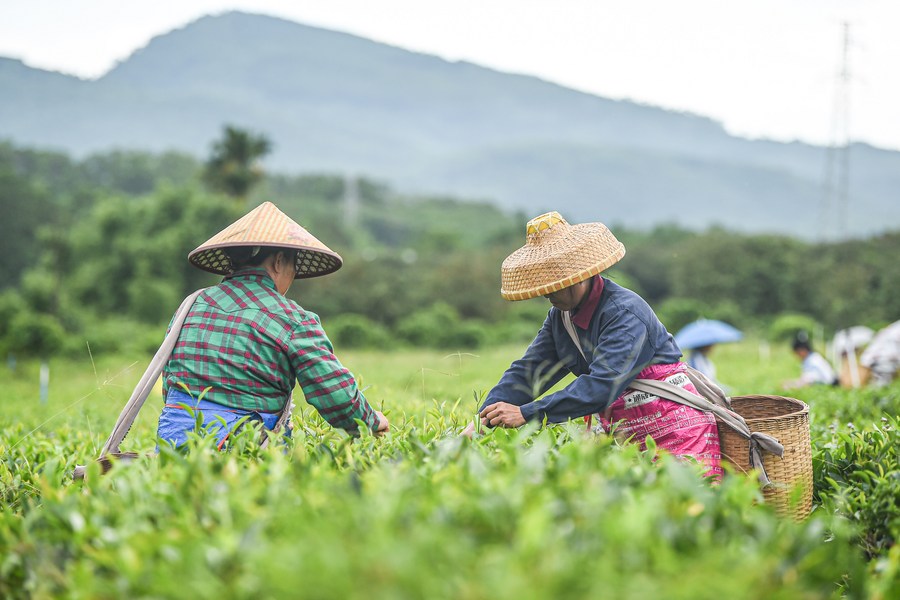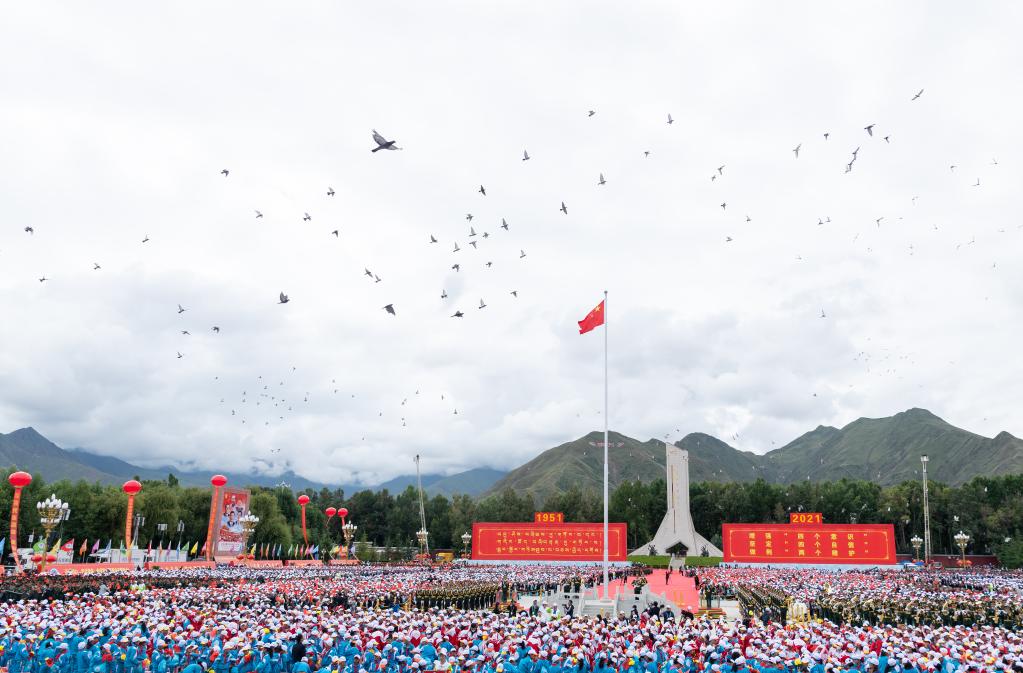The CPC Leadership Has Ensured China’s Development and Stability

Nepali Ambassador to China Mahendra Bahadur Pandey indicated that China’s ideology of valuing human life reveals the love and wisdom of China’s leadership.
“This year marks the 100th anniversary of the founding of the Communist Party of China (CPC). It is also the first year of the implementation of China’s 14th Five-Year Plan. I think the development context of this plan will be even stronger than it was previously, and the economy will be even more advanced by the end of this plan,” said Nepali Ambassador to China Mahendra Bahadur Pandey in an interview with China Today.
Pandey once served as Nepali Minister of Foreign Affairs and has a deep understanding of China’s development path and strongly supports it. During his time serving in China as the Nepali Ambassador, he gained new insights into “Why the CPC Works,” having witnessed for himself the major strategic achievements made by China in its fight against the COVID-19 pandemic and the complete victory it has won in the battle against poverty.
Endorsing China’s governance ideology
Pandey started to read extensively about the CPC as a young school student, and became quite fascinated with the struggles the party went through to bring its people a better life. He understands the long and complicated history of China and how the CPC came into being and successfully led the Chinese people in establishing a new China and pursuing the modern era. Pandey observed that today the CPC under the leadership of General Secretary Xi Jinping, promotes the path of peaceful development as he believes that people of the world need to maintain harmonious relationships, and enjoy democracy and openness.
When sharing his reflections on China’s governing philosophy, Pandey especially applauded the CPC’s principle of being people-centered and making it possible for all people to share the benefits of development. “The Communist Party of China implemented the governance concept of ‘people-centered,’ and as a result, China was able to successfully bring the spread of COVID-19 under control and usher in a more harmonious prosperity. More people should realize the importance of the governing concepts of Marxism-Leninism and a ‘people-centered,’ approach and comprehend and follow them,” he said.

In 1971, the United Nations (UN) voted and restored the lawful seat of the People’s Republic of China in the UN. After that, China has maintained close contacts with leaders and peoples of countries around the world, and worked closely with UN organizations. “The world is in need of mutually beneficial cooperation, and people need democracy, equality, freedom, and peace. Similarly, countries and people in the world want to maintain equality, harmony, and fraternity, thus making this the demand and need of the times. China has proposed ideas for global peace and development,” Pandey said, then went further on to explain how China was previously criticized for being a closed country, but now everyone can see how China is continuing to open its doors wider, and Chinese President Xi Jinping has promised that China’s doors of opening-up will not be closed. Meanwhile, some countries are following a path of increased protectionism and unilateralism. Pandey stated that what the world needs today is multilateralism, and this will benefit all the countries and peoples of the world.
China’s secret of success in overcoming poverty
“Since everyone enters this world empty handed, both poverty and affluence are caused by human activities. Throughout human history, we have seen the phenomena that one part of society becomes affluent, while the other side — a majority of the people lack food and clothing, cannot obtain medicine, and cannot receive education,” said Pandey, adding, “Poverty is not a good thing and must not remain in this world.”
In the year 2000, the UN member states agreed upon and announced the Millennium Development Goals (MDGs), and 15 years later, it again declared 17 sustainable development goals based on its success in achieving the previous MDGs. Every country in the world must try their best to achieve these goals by the year 2030. Poverty is a global challenge that mankind must face together. The United Nations’ 2030 Agenda for Sustainable Development places poverty eradication as the first responsibility. Eliminating every form of poverty is the common goal of human society.

When discussing China’s experience in poverty reduction, Pandey said, “We have to mention that China’s collective leadership, scientific researchers, and think tanks have achieved a great victory. They focused on eradicating poverty by selecting development methods which met the needs of different regions, developed an affluent society, and explored a practice of poverty eradication that other developing countries could learn from.” According to Pandey’s understanding, China’s experience in poverty eradication can be summarized in three points: First China crafted targeted poverty alleviation measures suitable to local conditions of different regions; secondly, it effectively leveraged local advantageous resources; and thirdly, it greatly inspired its people to implement the plan.
In addition to this, Pandey said another important point worth mentioning in regards to China’s success in poverty reduction is that the country has a stable ruling political party that has a very pro-active and hard-working collective leadership. As a result, they have brought their poverty-stricken population above the poverty threshold. “We congratulate China’s leadership and the Chinese people. They have set an instructive example by what they have done in eradicating poverty and maintaining global peace, something leaders of countries around the world should study and learn from,” Pandey said.
Caring for all people
Since the outbreak of COVID-19, the measures China has taken to control the pandemic within its borders have been recognized and lauded by the rest of world. However, the situation in many other countries still remains quite precarious. “As far as I know, the vaccines developed by China have not only been taken by large numbers of Chinese people, but many other countries have also already accepted vaccine donations which China has shipped out to them,” said Pandey, “Our country, Nepal, has already received 180,000 doses of vaccines from China, and we have been using this vaccine to save the lives of our people. For all of this, we would like to express our deepest gratitude to China.” When discussing about intellectual property rights protection issue regarding developing vaccines, Pandey fully supported China’s practice of not making vaccine development a political issue. “China’s President Xi Jinping has emphasized that though this vaccine has been developed with great intellectual efforts, it should not be delimited by intellectual rights. President Xi also emphasized the affordability of the vaccine, which means knowing the affordability of the developing world and supplying the medicine to them according to that price.”
Pandey indicated that China’s ideology of valuing human life reveals the love and wisdom of China’s leadership. As a neighboring country and partner of China, Nepal highly appreciates China’s achievements.

The Himalayas, a bond of China-Nepal friendship
Pandey spoke very highly of the Nepal-Chinese relationship, saying, “China and Nepal are good neighbors and our people are close friends. Some countries in the world are neighbors because that is the fate of their geographical environment, but this does not mean they have a peaceful relationship. In contrast to this, the China-Nepali relationship is very harmonious. The two countries treat each other with equality and mutual respect, and seek to develop together in a peaceful environment. The amity our two countries share is an inspiration to the rest of the world.”
This year marks the 70th anniversary of Tibet’s peaceful liberation. Pandey remarked that the life of Tibetan people under the system of serfdom was one of suffering and brutality, living without a sufficient supply of food with some even begging on the streets. Tibet before liberation was ruled by a feudal serf system and governed by so-called “religious leaders.” The people of Tibet were really oppressed during that period. After the liberation, China has pooled the national effort to develop Tibet and protect its ecological environment.

Looking into the future, Pandey believes that the Himalayan Mountains are the bond of friendship between China and Nepal. Being affected by global climate changes, the snow-capped mountains are slowly melting. China and Nepal need to work together to combat climate change and protect the holy mountains and lakes that are the natural wealth of both of them. At the same time, both countries can share with each other their products and production techniques, he pointed out. More than that, the two countries can further deepen their cooperation in various fields ranging from manufacturing, agriculture, trade, technological development, education, and medicine, the ambassador observed.
Pandey also pointed out that while celebrating 70 years of liberation, the Tibetan people are merrily immersed in a festive atmosphere. At the same time, however, those who do not want to see China prosper still blindly finger point at China. He said it puzzles him sometimes how some countries with quite serious racial discrimination problems where the protection of life cannot be ensured, has been continuing to criticize China. Some so-called “human rights organizations” release reports without anything favorable to say about the changes in Tibet. Pandey says Nepal has also been slandered by such reports. He expressed his view that human rights and democracy should not be used to as a tool to demean others, but rather should be exhibited in the lives of the people. The development and progress of Tibet is indisputable fact, as witnessed by many people in Tibet and Nepal.
“In China, people do not exploit one another, and everyone is respected. China is a true democratic country. Words such as democracy, liberty, equality, fraternity, and so on should not merely be the linguistic pearls that decorate speeches of politicians, but be the pillars that hold together the lives of every human. In this regard, the ideology of China and Nepal is the same, thus enabling us to join hands together in international matters and promote reform for the sake of the whole of humankind,” he said.
 Facebook
Facebook
 Twitter
Twitter
 Linkedin
Linkedin
 Google +
Google +










